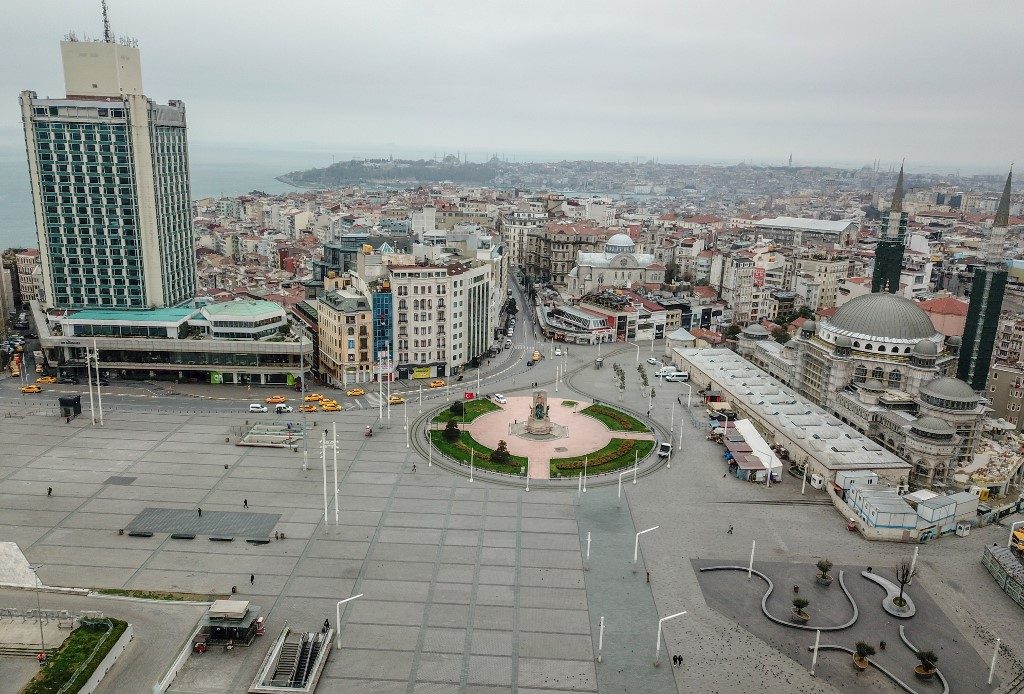SUMMARY
This is AI generated summarization, which may have errors. For context, always refer to the full article.

ANKARA, Turkey – The Turkish economy was healing after a recession when the new coronavirus struck, leaving Ankara scrambling to contain the damage with stimulus measures worth billions and facing demands to do much more.
The death toll in Turkey is 168 with 10,827 recorded cases of the virus but the fear is that the situation could get much worse.
President Recep Tayyip Erdogan announced earlier this month a $15-billion package to support the economy, with tax cuts for businesses and measures to help low-income households.
While business leaders and analysts agreed Ankara’s measures would benefit companies, experts warned of higher unemployment and lower growth.
They also pointed to the possible devastating impact on tourism, which employs hundreds of thousands of people.
The concern is that before the outbreak, the economy was growing only tentatively after a currency crisis in 2018.
Moody’s ratings agency said among the G20, it expected Turkey “to be hit the hardest, with a cumulative contraction in 2nd and 3rd quarter GDP (gross domestic product) of about 7%” in 2020.
But as recently as March 19, Finance Minister Berat Albayrak said he did “not see any risks to the economy for now” and was still aiming to meet the ambitious target of 5% growth for 2020.
“The shock will likely take a large toll on tourism-related sectors through the summer,” Moody’s added.
Last year, tourism income rose 17% to $34.5 billion while the number of visitors increased nearly 14% to about 52 million.
Unemployment fears
In an outdoor market in Ankara, residents were concerned about unemployment while traders were worried about keeping their households afloat.
Selling vegetables, trader Mehmet Arslan said the situation was “difficult” because his customers, mostly those above 65, have been told to stay at home.
“If we can’t do this work, how can we live?” the 35-year-old asked.
Other traders said sales were down 70% to 80%.
The jobless rate rose to 13.7% in 2019 from 11% in 2018, while inflation was 12.37% last month.
Among the unemployed, Bilge Ceyhan, 44, said the outbreak worried her.
“How am I going to continue my [job] search? How will the [job] market be after this?” Ceyhan said, adding her savings would not last forever.
Atilla Yesilada, analyst for the GlobalSource think tank, said Ankara’s measures so far were in line with other countries, “but extremely inadequate given the kind of projections I and other experts have in mind.”
He warned there could be many job losses as more shops shut, and recommended the government offer financial support more easily.
‘Write a check’
In mid-March, the government said nearly 150,000 businesses had temporarily closed.
“The American way is the safest way: write a check, don’t ask questions,” Yesilada said. “You’re doing it to ensure unemployment doesn’t hurt the rest of the economy.”
Erdogan last week announced more measures including $1.1 billion to support workers on the minimum wage after criticism the initial package supported businesses more than employees.
He said 1,000 lira ($155) would be also provided to two million low-income families each.
Finance Minister Albayrak said there would be an employment support scheme to protect jobs which businesses can apply for.
‘Unprecedented’ situation
The government budget was “generously” spent last year, Yesilada said, adding Ankara had no cash and that eventually more money could have to be printed.
This in turn would push inflation higher.
But the analyst said Turkey had the option to apply for money from the International Monetary Fund – which Erdogan has previously vowed to avoid.
Cagatay Ozdogru, chief executive officer of Turkey’s largest family-owned investment firm Esas Holding, said the country was in a better position than others and had “advantages,” including a young population and experience with crises.
Domestic demand was robust, he told Agence France-Presse, adding that once shops started to reopen, customers would return to their usual consumption.
But he suggested Turkey also needed Western economies to get back on their feet, which “could take some time.”
Turkey’s growth would fall in the short term before improving again, Ozdogru added.
“This is an unprecedented situation, everyone’s making mistakes and 90% of what [Ankara] is doing is from the international playbook but they need to do more,” urged Yesilada. – Rappler.com
Add a comment
How does this make you feel?
There are no comments yet. Add your comment to start the conversation.